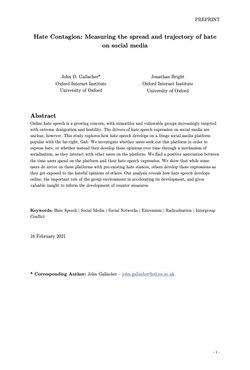By Helen Young and Geoff M. Boucher
Digital publishing, sale and distribution of books have contributed significantly to the dissemination and mainstreaming of far‐right extremist (FRE) material in the 21st century. Historical and contemporary books that espouse politically and ideologically motivated violence circulate widely and easily online, in both FRE and mainstream spaces. Such books include, but are not limited to: the speeches of Adolf Hitler, William L. Pierce’s The Turner Diaries, Theodore Kaczynski’s Industrial Society and its Future (The Unabomber Manifesto), James Mason’s Siege, and anthologies produced by the Iron March forum and Terrorgram Collective.
Commercial book publication, sales, distribution and sharing platforms play a significant role in enabling the circulation of FRE material, as this report details through analysis of Amazon, Google Play, Rakuten Kobo, Goodreads, and Scribd and its e‐book‐platform, Everand. An autoethnographic ‘snowball’ methodology was used, exploiting the features of commercial book platforms, such as search functions and algorithmically driven recommendations. FRE books were quickly and easily located on all platforms analysed.
There are two principal ways that major e‐book sites enable the circulation of FRE material:
Distribution: of self‐publications by FRE authors (through Amazon Kindle, for example), access for ideologically motivated small presses to large marketplaces, and users’ sharing of FRE material including manifestos (on Scribd, for example)
Recommendation algorithms on all platforms directing users from one FRE title to another, or from Far‐Right material that does not meet the threshold of extremism to that which does.
Recommendation algorithms are particularly problematic because they have the capacity to direct users who have not yet encountered extremist material towards FRE books and to actively reinforce extremist perspectives.
Technology companies have already taken steps to remove some of the most notorious FRE books from sale, distribution and discussion. In the case of extremist novels, such as The Turner Diaries, searches typically meet a dead end and return purchasing recommendations of books on anti‐racism and de‐radicalisation rather than hate fiction.
This report recommends that the companies surveyed extend this practice to other FRE materials documented below, using available techniques to understand and interrupt the formation of a network of recommendations which leads individuals towards publications advocating political violence. The report also recommends the use of available techniques (such as machine learning) to scrutinise the nature of self‐published materials, with the aim of preventing reproductions of materials that are refused classification from being published spuriously under misleading titles or pseudonyms.
The report is agnostic on whether such companies should stock the speeches of Adolf Hitler, for instance, focusing instead on potential problems in the way the affordances of search technologies provide ready‐made FRE libraries.
London: Global Network on Extremism and Technology, 2023. 36p.










